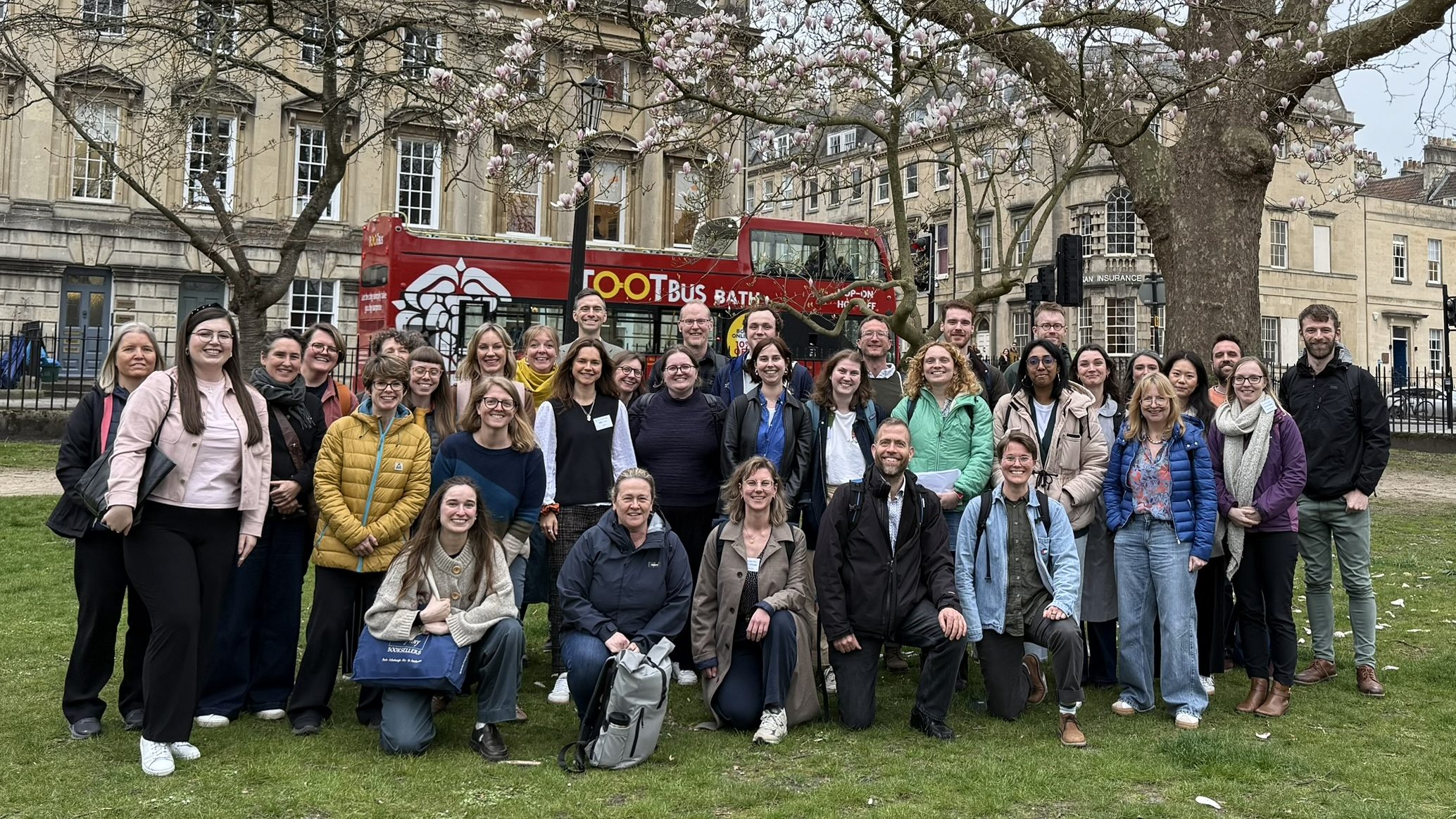We’re proud to bring together a dynamic network of world-leading experts who are committed to putting people at the heart of climate action. Over five years of research, we have established a thriving community of over 70 climate change social scientists.
We’ll list any CAST career opportunities below, including PhD studentships with our member institutions.
If there aren’t any opportunities listed right now, or suited to what you’re looking for, subscribe to our newsletter and follow us on BlueSky and LinkedIn to keep up to date on the latest CAST career opportunities.

The CAST team at the 2025 Annual Assembly event in Bath.
Research Project Manager at the University of Bath
- Job type: Part-time, Fixed Term
- Location: University of Bath
- Deadline: Monday, March 15th, 2026
Role overview:
We are seeking a Research Project Manager to manage a major new programme of social science research, funded by a philanthropic organisation, on People-Centred Climate Resilience (PCR). You will report to the CAST Director / PI, and work closely with the CAST Centre Manager and CAST hub team.
The Research Project Manager will work alongside academic staff, other professional services staff, and with the funder and stakeholders from partner organisations to manage the delivery of the PCR programme, which comprises nine individual research projects and spans partners from several research organisations.
Research Fellow at the University of Bath
- Job type: Full-time, Fixed Term
- Location: University of Bath
- Deadline: Monday, March 16th, 2026
Role overview:
We are seeking an experienced Research Fellow to lead a programme of quantitative behavioural research to advance understanding of climate-relevant behaviour change and life choices.
The role will involve co-designing research with stakeholder partners, data collection and analysis, and disseminating findings to create impact.
This is a key role in a major new programme of social science research, funded by a philanthropic organisation, on People-Centred Climate Resilience (PCR).
CAST PhD studentship at the University of Bath
Understanding and addressing public resistance to ambitious climate policies
- Primary supervisors: Prof Lorraine Whitmarsh, CAST Director & Theme 4 Co-lead & Dr Sam Hampton, Research Fellow & CAST affiliate
- Job type: Full-time
- Location: University of Bath
- Deadline: Wednesday, March 18th, 2026
Topic overview:
This PhD will assess the prevalence of discourses of delay and waning public support for specific climate mitigation and adaptation policies. It will also investigate the factors behind these trends, and test interventions to rebuild trust and promote climate-positive attitudes and behaviours. The studentship provides a unique opportunity to spend 2 years in Brussels on a competitive salary, working at the research-policy interface.
CAST PhD studentship at the University of Bath
What works: Translating research and policy evidence into effective climate-resilient behaviour change
- Primary supervisor: Prof Lorraine Whitmarsh, CAST Director & Theme 4 Co-lead
- Job type: Full-time
- Location: University of Bath
- Deadline: Thursday, April 9th, 2026
Topic overview:
This PhD will investigate how evidence on climate resilient, low-carbon behaviour change is generated, interpreted and used (or not used) in policy and governance. The project will critically review existing research and policy evidence on behavioural interventions, with a focus on understanding what kinds of knowledge are seen as credible and useful by decision-makers, and where important gaps or blind spots remain.
CAST PhD studentship at the University of Bath
Professionals and workplace interventions for climate mitigation and adaptation
- Primary supervisor: Prof Lorraine Whitmarsh, CAST Director & Theme 4 Co-lead
- Job type: Full-time, Fixed Term
- Location: University of Bath
- Deadline: Thursday, April 09, 2026
Topic overview:
This PhD will explore how professionals and organisations can act as catalysts for people-centred climate action. The project will focus on “intermediary” roles – such as health and social care professionals, agricultural advisers, business and public sector managers, or professional networks – who influence the behaviours of others.
CAST PhD studentship at the University of East Anglia
Mobilising community-based climate action through co-designed sports and wellbeing interventions
- Primary supervisor: Prof Irene Lorenzoni
- Job type: Full-time
- Location: University of East Anglia, School of Environmental Sciences
- Deadline: Thursday, April 16, 2026
Topic overview:
This studentship will examine how individuals within organisations can be developed as effective sustainability change agents. The research will explore both the external pressures and internal motivational forces that shape pro-environmental attitudes and behaviours, and the practical strategies change agents use to secure stakeholder buy-in and connect internal activities to external standards. This may include exploring how digital tools, green apps or AI-enabled interventions can support or hinder these efforts. This PhD offers an opportunity to understand how individuals drive sustainable ways of working in contemporary organisations and the implications this has for new ways of working.
CAST PhD studentship at the University of East Anglia
Environmental Change Agents in hybrid and remote work environments: an investigation of how digital workplaces affect coalition building and sustainability culture diffusion
- Primary supervisor: Dr Jun Hwa Cheah
- Job type: Full-time
- Location: University of East Anglia, Norwich Business School
- Deadline: Monday, April 20, 2026
Topic overview:
This studentship will examine how individuals within organisations can be developed as effective sustainability change agents. The research will explore both the external pressures and internal motivational forces that shape pro-environmental attitudes and behaviours, and the practical strategies change agents use to secure stakeholder buy-in and connect internal activities to external standards. This may include exploring how digital tools, green apps or AI-enabled interventions can support or hinder these efforts. This PhD offers an opportunity to understand how individuals drive sustainable ways of working in contemporary organisations and the implications this has for new ways of working.
